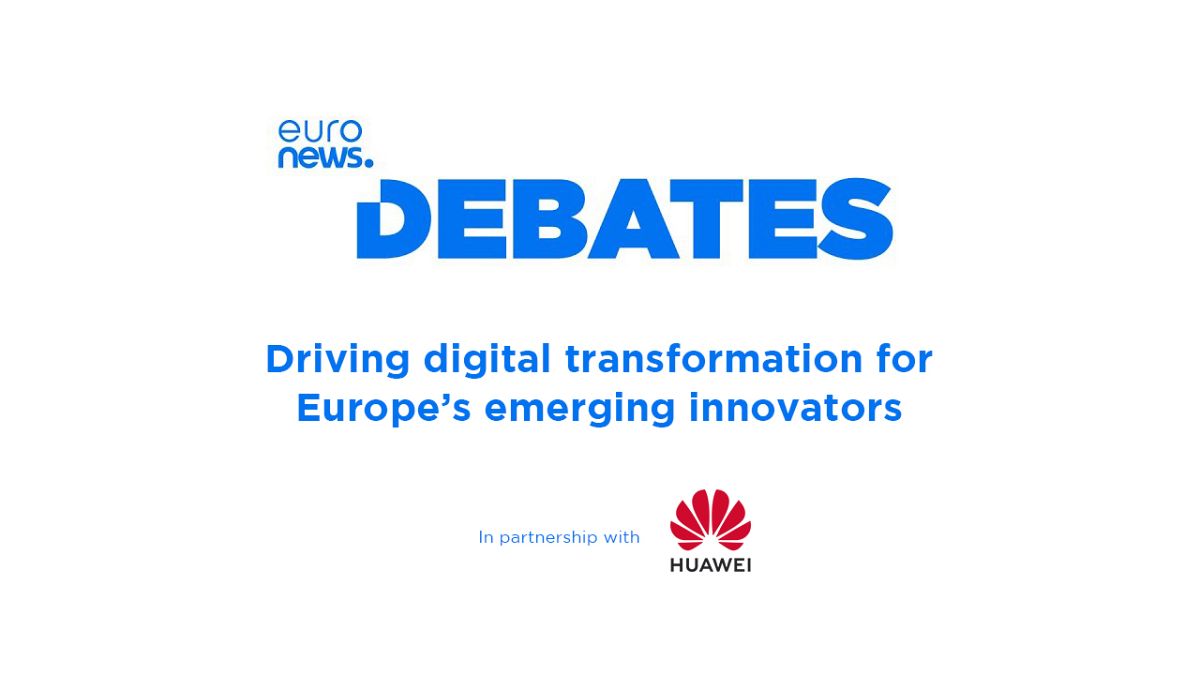Watch our live debate in the video player at the top of the article to hear how technology experts and professionals are accelerating the digital transformation of Europe’s SMEs.
Taking the plunge to go digital and invest in information technology can be a challenging step for Europe’s small and medium-sized businesses, but case studies show it boosts profits, productivity and innovation.
In this Euronews debate, our expert panellists discussed how to drive digital innovation, support companies in their transformation to digital and take advantage of help from specialised companies like Huawei and EU government programmes.
“The progress of digital transformation in Europe is slower than planned,” said Zhu Xiaoming, Vice President of Global Industry Development at Huawei Cloud. “The EU target for 2030 is to have 90 per cent of SMEs digitalised, but now it is only 64 per cent.”
You can watch the live debate in the video player at the top of this article.
Inaccessibility and overregulation are the biggest challenges for digitalisation
Our panellists identified overregulation as one of the biggest hurdles to SMEs going digital.
“Unfortunately, during the past five or ten years, compliance became a business defining function which creates not only administrative but sometimes psychological barriers to innovations,” said Alexander Pisemskiy, CEO of Zenpulsar which leverages AI and data to help investors globally to make smart investment decisions.
He gave the example of the General Data Protection Regulation (GDPR), which plays a significant role in protecting privacy, citing its impact on the speed at which new technology can be implemented.
“We are overdoing all the regulations which make the public always afraid of AI and other technology, but they also need to see the chances [they provide],” concurred Horst Heitz, Chairman of the SME Connect Steering Committee.
Gaurav Tripathi is the co-founder and group CTO of Innoplexus AG, a company that empowers customers and partners with AI to develop newer, more efficacious therapies faster. He added that inaccessibility and skilled employees were key issues.
“Access to high-quality data, skilled team members and access to cost-efficient cloud computing are the biggest challenges,” he said.
For Zhu too, there are “insufficient technical employees and a high cost of infrastructure” that is holding back the digital transformation of SMEs.
Ana Paula Nishio de Sousa, the Chief of the Division of Digital Transformation and AI Strategies at the United Nations Industrial Development Organization (UNIDO), said this is a particularly big issue in Eastern European countries.
“Our footprint in Europe is mostly eastern countries. We are doing work to create innovation ecosystems to help companies to get on their feet and to improve access to finance and skills by capacity building,” she said.
Heitz added that a ‘one size fits all’ approach is also an error. He gives the example of the ‘problem’ that only 50 per cent of SMEs have a website.
“This is the wrong question because not all SMEs need a website. We have to say which specialisation each needs because SMEs are very diverse,” he said.
The demand of consumers and partners also needs to be taken into account. “If my customers don’t want to pay digital, why should I change the business model,” he said.
“We need to change the questions to make it less general.”
There are some solutions for businesses to improve their competitiveness
Specialised programmes from companies like Huawei are working to facilitate the digital transition for startups and SMEs.
“The Huawei Cloud platform provides cutting-edge technology like AI, big data analysis and cloud databases to enable startups to develop and employ applications faster and easier and enhance their competitiveness,” Zhu said.
“Startups are supported to use the programme in a cost-effective way and optimise infrastructure to better suit their business plan.”
The idea is for startups to lower the cost of their IT resources and technical support. Huawei Cloud also helps companies to go global and expand quickly to different geographical zones through networking software and collaboration platforms.
AI will have a major impact on empowering businesses
According to Heitz, “everybody needs AI” to take their business into the future. “We have to see where there are the barriers because it is time to implement this,” he said.
As Pisemskiy explained, “data is the only source of investment insight so AI data mining and cloud computing are essential.”
“Those investors who can work with vast volumes of information can be competitive on the market.”
His company Zenpuslar helps to leverage billions of data points, combine diverse data sets and spot trends that human beings will never be able to because it is beyond our capabilities.
“Our AI systems look in the past to understand how a corporate, regulatory or geopolitical development impacted markets and current models use mathematical analyses to empower investors,” Pisemskiy said.
Data protection and licencing with AI
Although several of our panellists highlighted overregulation as a barrier to progress, Nishio de Sousa reminded us of the importance of regulations like data protection.
“Regulations need to be as low as possible but as high as necessary. They are rooted in fundamental rights and the key element is that personal data does not belong to tech or the government but to people,” she said.
Tripathi sees AI as the solution to the problem of data privacy and sharing. “Those who own the data have the right [to privacy] but I believe you have a duty as well that you should be ready to licence this data out for innovation,” he said.
“In the case of the healthcare sector, if patient data reaches pharma it can accelerate discoveries.”
He talks about how AI can be used in a way that organisations or companies don’t even need access to personal data but just to the model.
“Your data at no point is going anywhere and if you license it you know who is using it and for how long. Everything is very transparent,” he added.
He adds that in the future, AI will make it possible for “every skill and knowledge to be contained in models, an ecosystem where you will be able to licence your skill even as an individual.”
“There will be models and AI that communicate with each other, for example between a business and tax authorities, and get things done,” added Pisemskiy. “The human being will be a kind of orchestrator and controller.”
Meet the panellists:
Ana Paula Nishio de Sousa, Head of the Digital Transformation and AI Strategies Division at UNIDO
Ana Paula Nishio de Sousa is the Chief of the Division of Digital Transformation and AI Strategies at the United Nations Industrial Development Organization (UNIDO). With more than 30 years of experience in technology and digital transformation, including more than two decades in international development, she is a key figure in harnessing AI for sustainable industrial growth in developing countries.
At UNIDO, Nishio de Sousa leads the AIM Global Initiative, collaborating with expert organisations around the world on AI training and deployment projects in emerging economies. She is a frequent speaker at international forums, sharing insights on the role of AI in industrial development and its potential to address global challenges, with expertise in digital transformation strategies, AI governance and fostering innovation ecosystems.
Zhu Xiaoming, VP of Global Industry Development at Huawei Cloud
Dr Zhu Xiaoming is Vice President of Global Industry Development at Huawei Cloud, where he leads initiatives to drive innovation and digital transformation across various industries. With a Ph.D. from UC Berkeley and a background in telecommunications and AI, Dr Zhu brings extensive experience to his role in shaping Huawei's cloud strategies for various industries.
Prior to joining Huawei, Zhu made significant contributions to wireless communication technology, including the development of the first TD-LTE/TD-SCDMA multi-mode terminal chip approved for industrial use. He also founded Fandou Technology in 2014, which focuses on AI solutions for educational environments. At Huawei Cloud, Zhu continues to drive innovation and help enterprises leverage cloud computing and artificial intelligence to transform their operations.
Horst Heitz, Chairman of the SME Connect Steering Committee
Horst Heitz took up the role of Secretary-General SMEs of the Taxpayers Association of Europe (TAE) in July 2023. He joined the Steering Committee of SME Connect (SMEC) in 2017 and was appointed chairman in the same year.
Heitz is an Ambassador of the League for Digital Boost and Secretary General of SME Europe. He holds a PhD in Political Science from the University of Vienna.
Alexander Pisemskiy, CEO of Zenpulsar
Alexander Pisemskiy is an experienced tech entrepreneur, investor and advisor with a focus on cybersecurity, fintech and AI. He has co-founded successful companies including Zenpulsar, Kalita Partners, CSI Group), and Group-IB, and became a partner at PRYTEK Holdings.
He specialises in using technology to fight cybercrime, fraud and corruption, improve online integrity and trust and counter market manipulations. In his role as an investor and advisor, he shares technological and business expertise to support early-stage companies.
Gaurav Tripathi, CTO of Innoplexus AG
Gaurav Tripathi has over 19 years of experience in building and leading startups in video, big data, blockchain and AI. Tripathi is the co-founder and group CTO of Innoplexus AG, a company that empowers customers and partners with AI to develop newer, more efficacious therapies faster. He is also a board member of Amrit AG, a company that aims to create a universal treatment discovery engine for untreatable diseases.
Tripathi ideated and built an AI community of over 1,000 tech enthusiasts in Pune, aiming to position the city on the global AI map. He also launched the TIP tech internship program, providing students with valuable internship opportunities in the tech industry.












